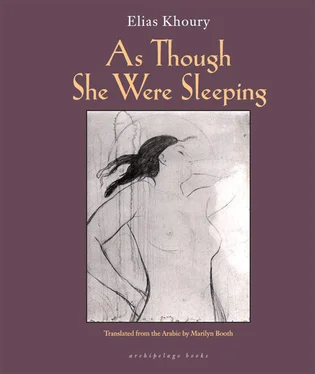The pastor told him everything, though. One day he came over to Musa’s table and asked if he could sit down. He began to talk. He asked Musa why the young man had not asked about Suzanne, since after all, he loved her. Musa stuttered and did not know what to say. The girl had returned to America, Yaqub Jamous told him, because she could not make herself feel comfortable living in the Holy Land. She refused to learn Arabic, and the Hebrew words she had learned in America were now forgotten. She told her father that when she first set foot in this land she was afraid and that had never changed. All she saw in her dreams, she told him, were nightmarish scenes of death. She hated it here, and she wanted to escape to Portland. The clergyman said he tried every possible argument to convince her to stay on. He had even talked to her about Musa. I told her that you love her and that love is the doorway to life, he said. But the girl was determined to leave, and now I don’t know what I will do with my own life here. The Arabs look on me as a Jew and the Jews say I have betrayed the faith of my forefathers. I will follow my daughter; I’ll go back.
Musa told his sister that he had been struck dumb, so astonished was he to hear the man asking him to accompany him to Portland. There’s plenty of work in America, he had said. You will join our church and our brotherhood, and I will see to it that you marry Suzanne. What do you say?
Musa did not know what to say. He was totally at a loss, hearing this unexpected question. Should he say that he realized now that the girl had not understood a single word he had said to her? And he knew that she had departed without even an inkling of how much he loved her? Or, should he tell the elderly clergyman that he did not like these new religions and that he had had enough religion in the form of the cotton balls soaked in oil that his mother had forced him to swallow when he was little? Or should he admit to the pastor that he did not even like the fish of Lake Tiberias and never had, from the very first bite? He had eaten it entirely for the sake of the pastor and his daughter. For real fish, he thought, you had to try Sultan-Ibrahim, a fish whose hues came from coral, sun, and salt. Nothing could be as good as the catch of saltwater fishermen. This lake which had witnessed the Messiah’s story had become a tedious place to be. Should he tell the man now that he intended to return to Beirut, where he could sleep his fill because the fresh moisture of the sea and the salt smells sent him sailing into a true and sound sleep?
Musa said he felt a serious trick had been played on him. He saw himself now as a gullible simpleton whom an American girl had bewitched merely with the fragrance of white skin that shimmered on her arms. He said he tried to look into the clergyman’s eyes — closed, as usual, for the man would drop his eyelids when speaking, as if listening to the demons he had summoned and who whispered into his ears. Musa felt betrayed. The pretty girl who had enticed him with the hammam’s fresh aroma had been nothing but a figment of his imagination.
Then the priest asked him why he had tried to deflower his daughter.
He said the girl had been in a state of shock after encountering Musa, and that she loved him. She told her father that she had fallen for the young Lebanese man who stood all day long at the bend waiting for her but never talked to her. It’s like he raped me, the girl said to her father. He came to the house. I invited him here. I met him three times. He walked with me to the hammam and sat on the sidewalk waiting for me. When I came out he would bring his face near my hair and sniff the smell as if he were inhaling me. Then he’d go away. The third time, after he sniffed my hair and turned away to go back to the hotel where he works, I took him by the hand and dragged him with me to the house. He seemed afraid. He almost fell down, more than once. But as soon as he came inside and saw that you were not here he fell on me and tried to rip my clothes off. I wanted him anyway so why did he have to do it like this? I felt like he was hurting me and I wanted to cry. He hugged me and then ran out of the house and I didn’t understand anything. Then I hated him, and I do not want to stay here for another minute.
Me, no! said Musa. No! She made up this story. The pastor began to fuss at the top of his voice, right in the hotel restaurant, and he caused a scandal for me, Musa told Milia.
Musa told only wisps of his story to his sister. It was as though he had lost his memory and the only incident that stood out for him, and that he could talk about, was the fact that he did not know the girl did not speak Arabic. It’s her father’s fault, he said to Milia. He was sitting with me at the table — he and his daughter — and we were always speaking Arabic. True, she never said anything but she acted as though she understood what we were saying. She would nod her head and laugh whenever her father laughed, as if everything were normal. And when I was walking around with her, she nodded as if she understood what I was saying, even though she never said anything. I just told myself, maybe this is the way she is. These new religious types, these Seventh-day people and all of these religious groups coming to us here from America, maybe in these groups women don’t talk to men until they’re married. God knows — but I think he was mad. I think the girl needed to escape from him, not flee from me.
The hotel manager, Khawaja Salhab, told me he had decided to ban the man from coming to the restaurant because every Sunday now he was getting drunk and picking arguments with customers. It isn’t a pleasant scene — a man of religion and always drunk, I don’t want this fellow around, said Khawaja Salhab. But now, tell me — between you and me, what do American girls taste like?
Musa said no one believed his version. They all insisted that they believed him but he could read the envy in their eyes, as if he had indeed slept with the girl. In the end, even he believed the story and in fact he would retell it to his own son Iskandar, who worked as a reporter and editor at the Ahrar newspaper in Beirut. When Musa turned seventy, the son asked his father what the truth was about the relationship between Marika and the bishop. And somehow Musa ended up telling him the story of his year at Lake Tiberias, when he was eighteen. He related how he had put his arms around the American girl, who didn’t say a word, and then suddenly all he wanted was to run away. It wasn’t that he made a decision to leave the place, but he just suddenly left. That was the last thing I expected, he confided to his son. I saw myself — without even quite understanding what was happening — inside her and I was terrified. All I remember is how frightened I was and how alone I felt as I listened to her calling for help.
So, that story was true? asked his son.
I don’t know. I do know for certain that the clergyman did not tell the truth. I hadn’t yet discovered the way things work. I always refused to go with other young men to Tel Aviv. They said, There you can find bars and women. I didn’t go, not once. Later, in Beirut, I learned the way with a girl from Aleppo — I don’t remember her name. But that’s how the world was in our time. A fellow couldn’t do anything outside of the whores’ souq . That’s where we all learned. But the American girl in Tiberias — that really was a love story, and she crossed it off. Maybe it had nothing to do with her. Her father was crazy-mad and he made up the rape and all of that. But the real problem was the nun. The nun announced that she smelled sin. My mother, God have mercy on her, started pressuring me to go to church and confess, and I didn’t have anything to confess to. What was I going to say? Anyway, the truly important thing is that the only one who stood with me, and told my mother to leave me alone, was my dear sister, Milia.
Читать дальше












